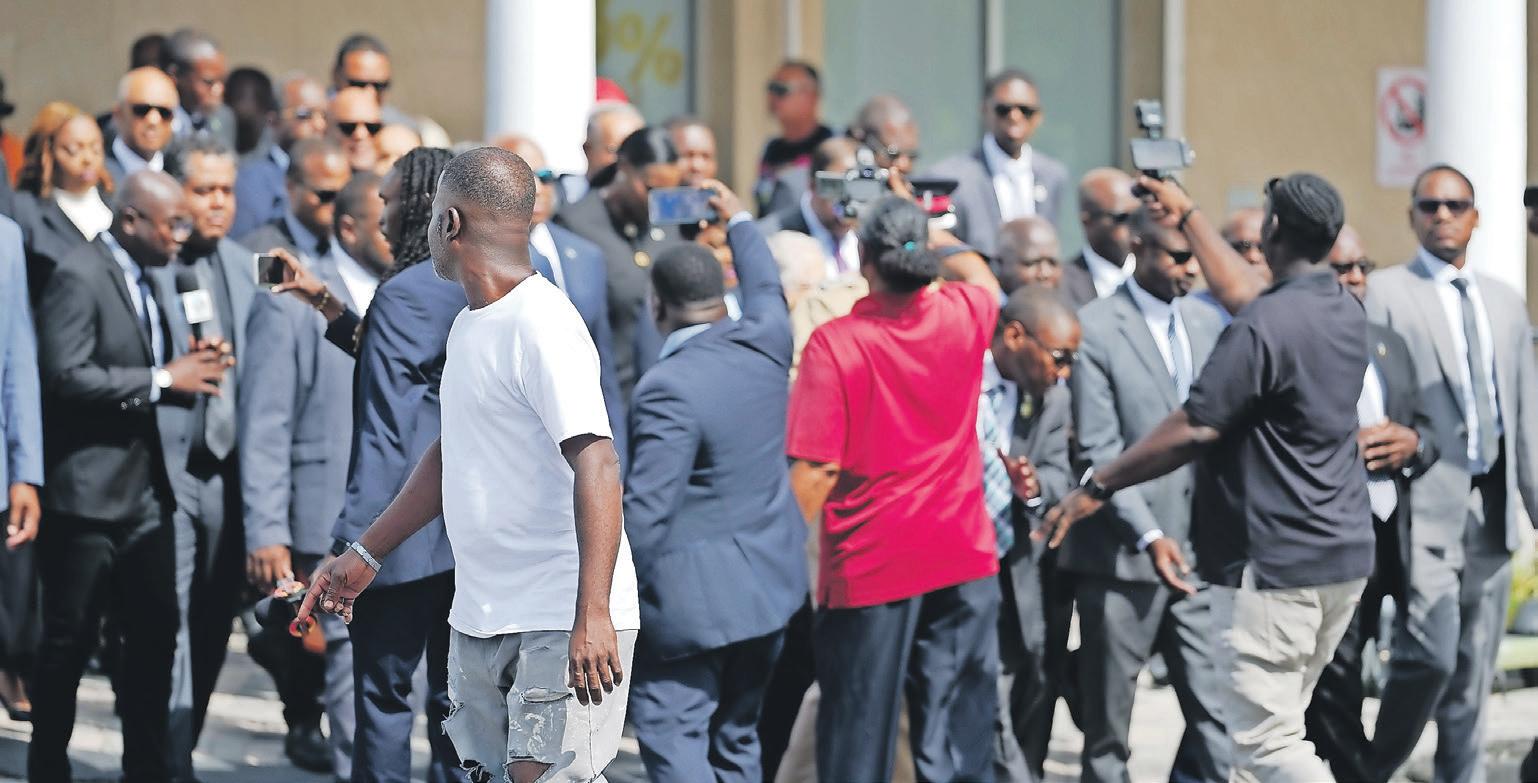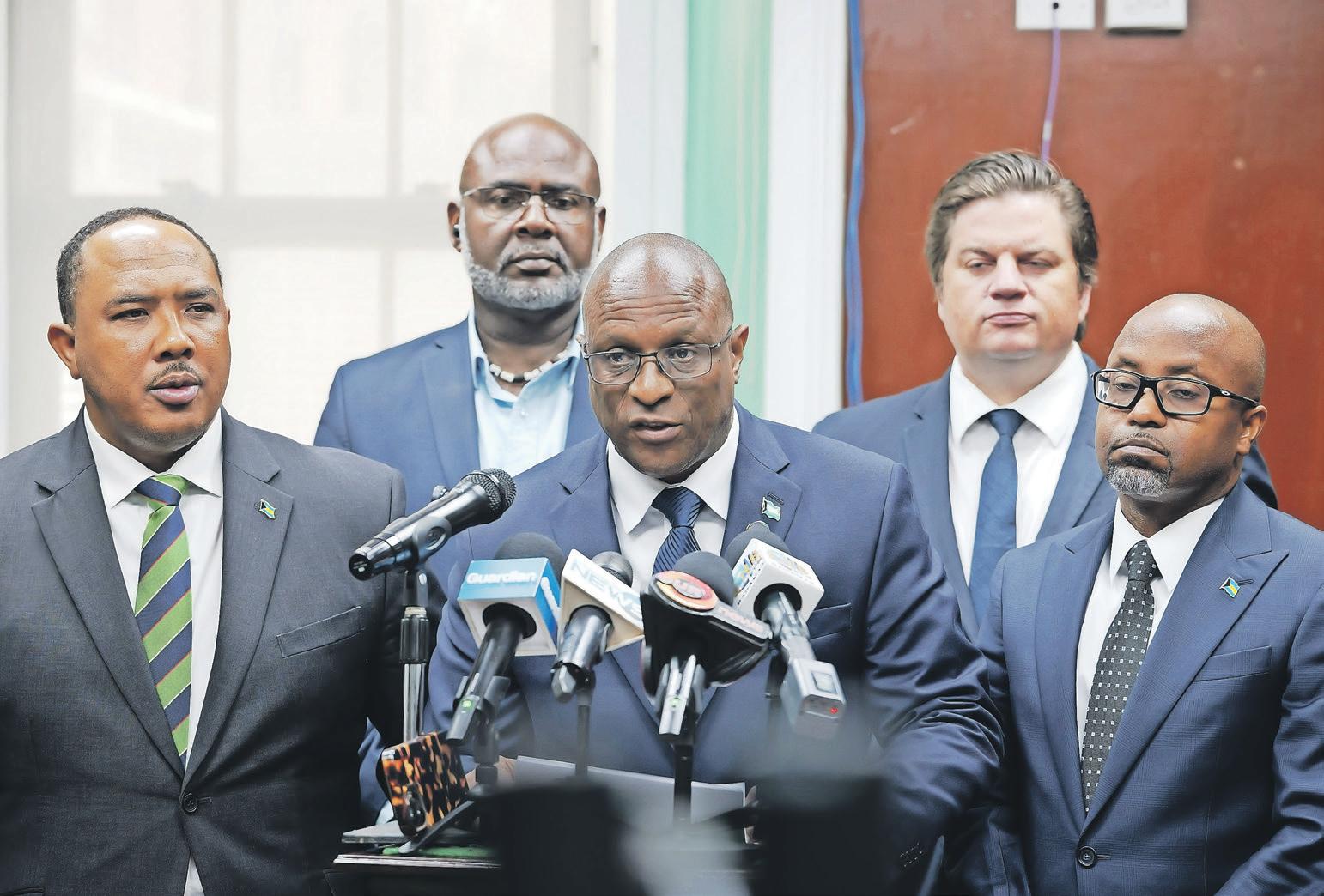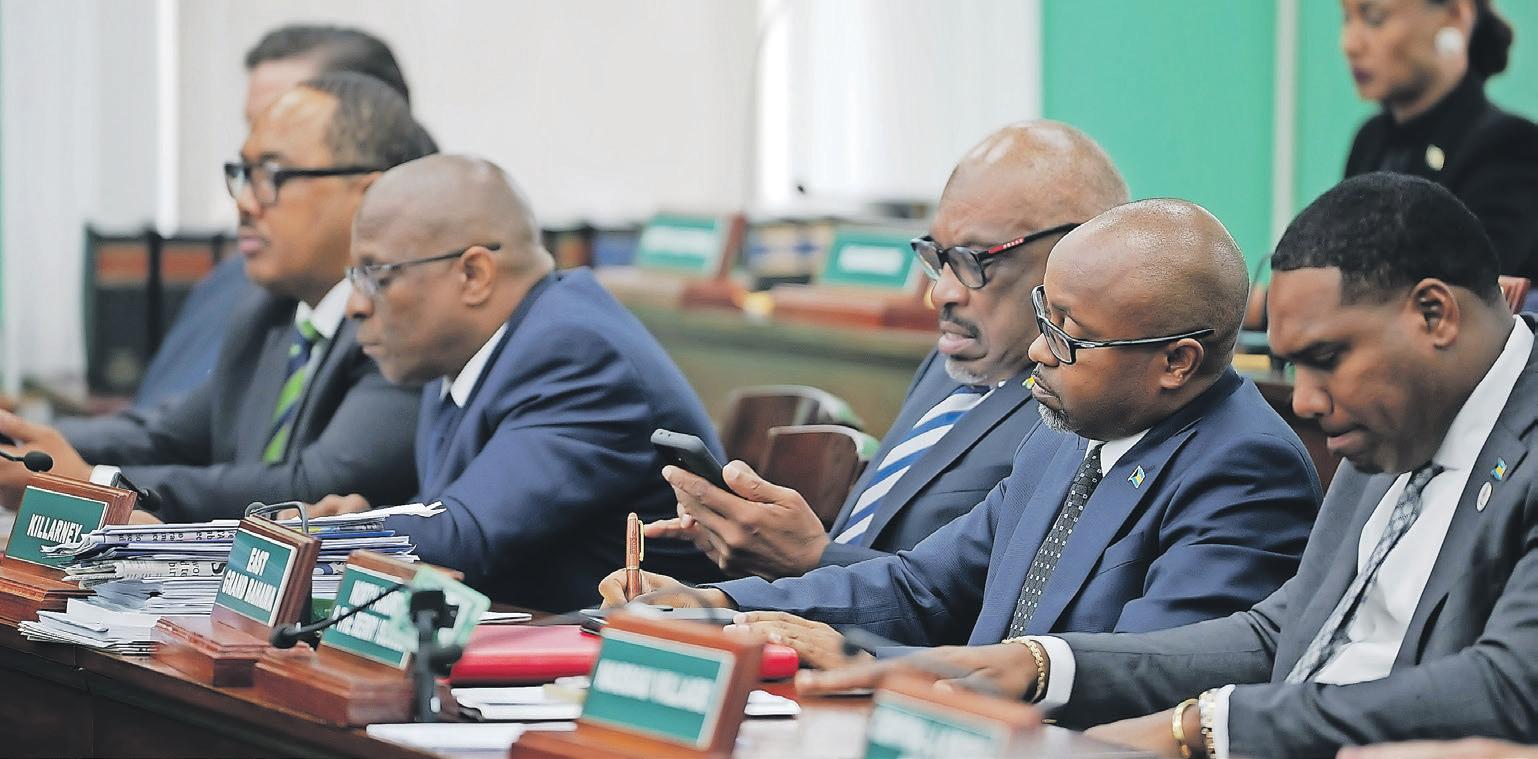




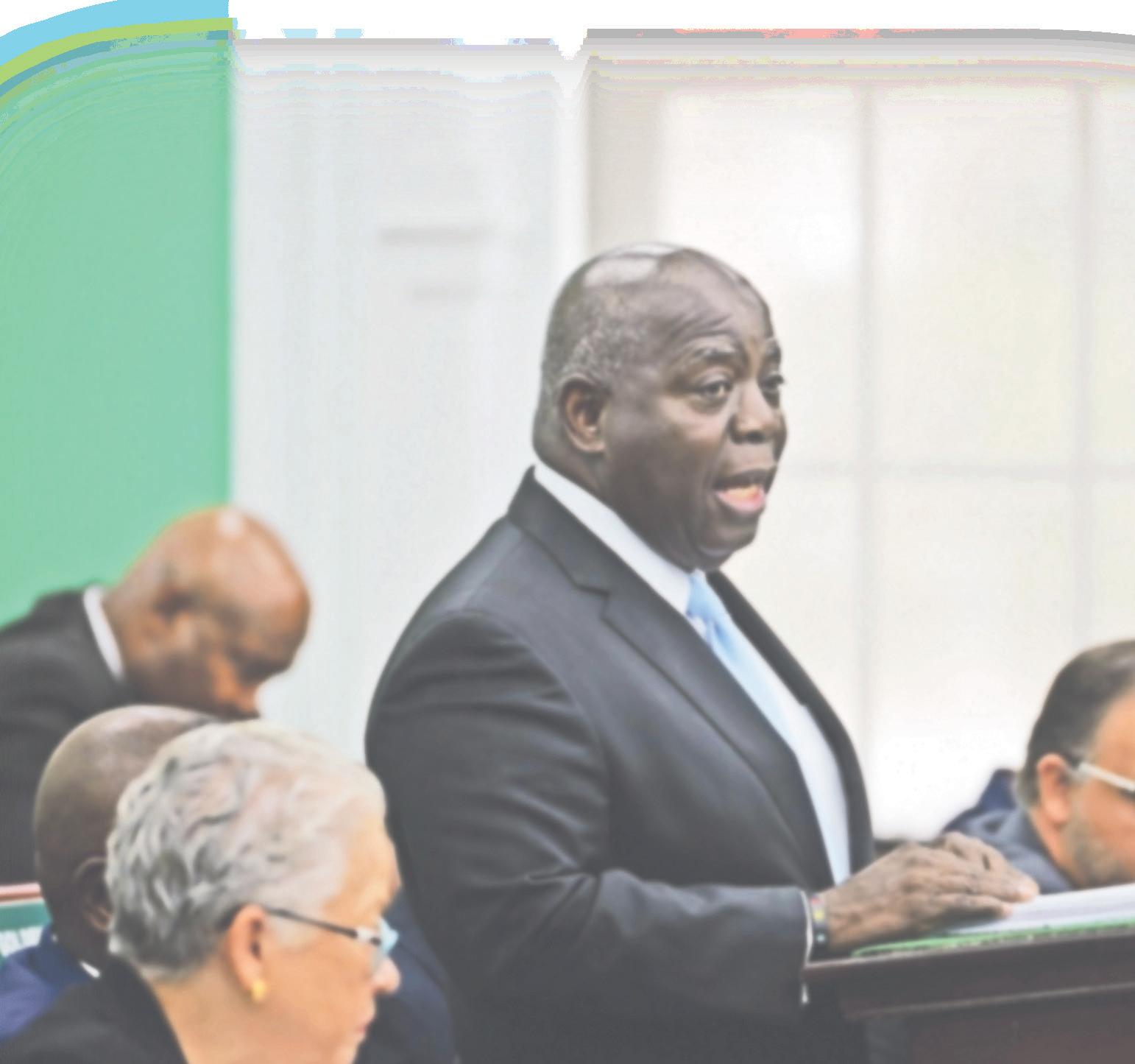
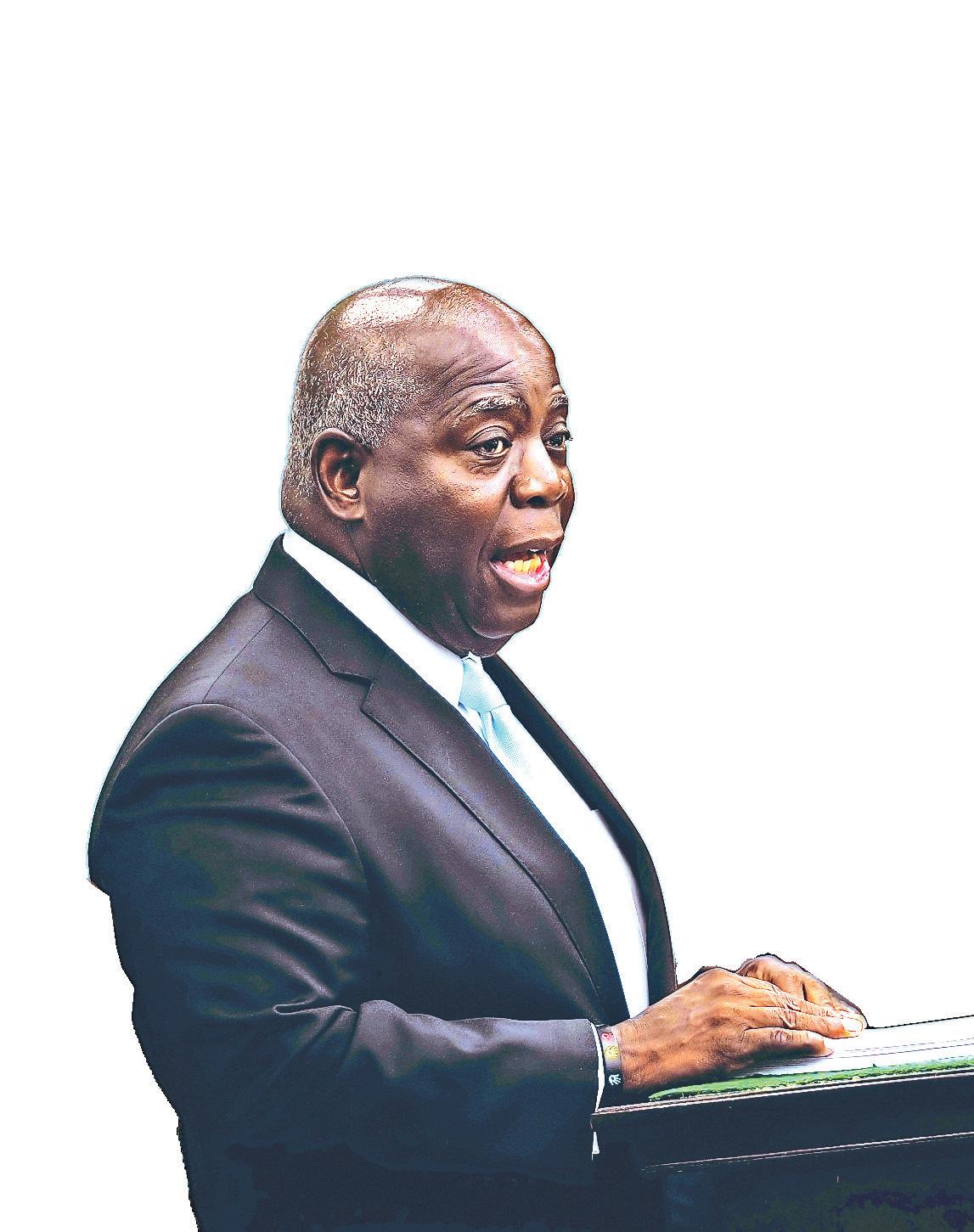

By LEANDRA ROLLE
Chief Reporter
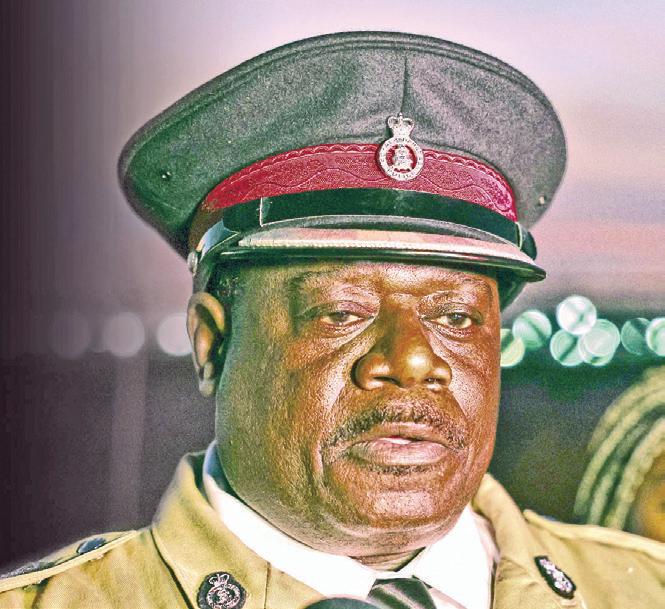
By LEANDRA ROLLE Tribune Chief Reporter lrolle@tribunemedia.net

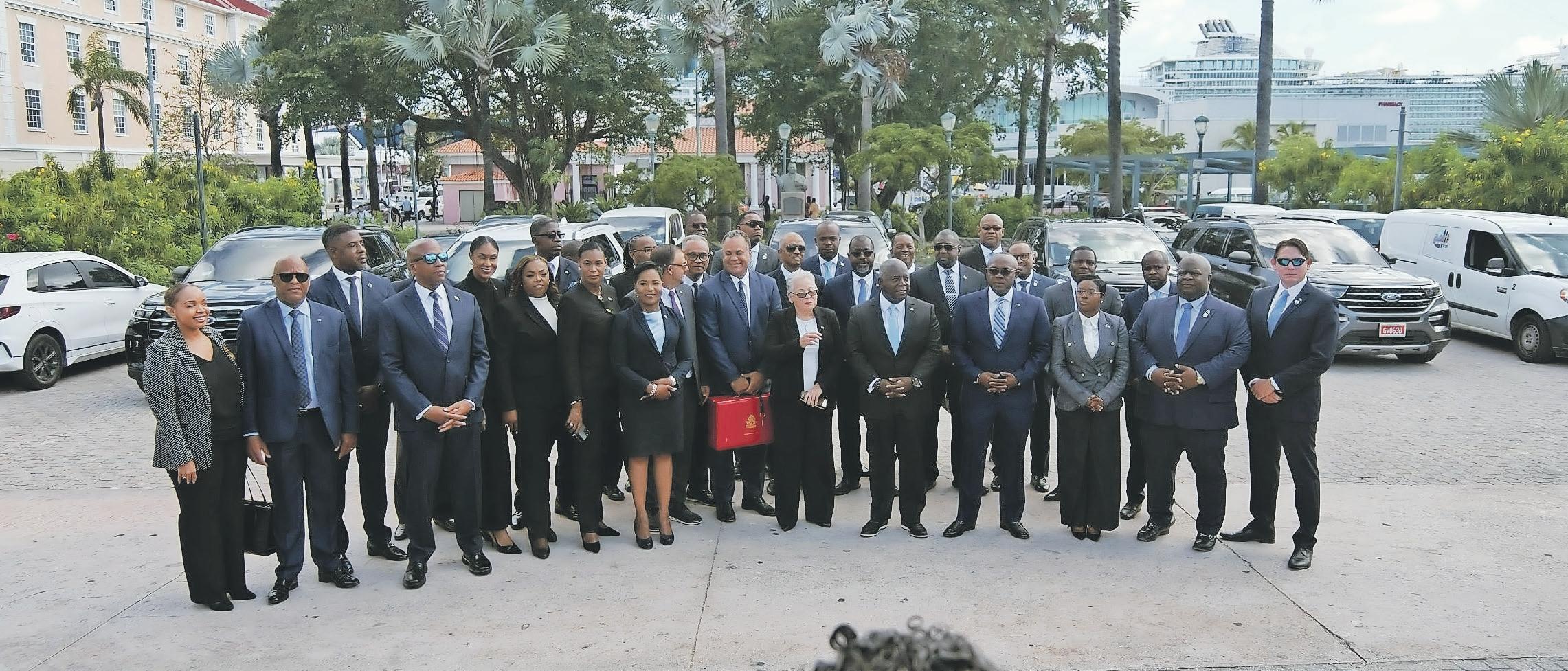












By LEANDRA ROLLE
Chief Reporter

By LEANDRA ROLLE Tribune Chief Reporter lrolle@tribunemedia.net






By JADE RUSSELL Tribune Staff Reporter jrussell@tribunmedia.net
AFTER slashing VAT on grocery items from ten percent to five percent earlier this year, Prime Minister Philip “Brave” Davis has announced additional tax relief, this time on essential products such as medications, feminine hygiene items, and baby diapers. The new VAT rate of five percent for these goods will take effect on September 1.
During his 2025/2026 budget communication in the House of Assembly yesterday, Mr Davis said global inflation has led to rising prices worldwide, including in The Bahamas. He highlighted the financial strain Bahamian families are facing due to the increased cost of food, household items, and basic hygiene necessities. He said his administration remains committed to easing these burdens.
The VAT reduction will apply to a range of products, including baby diapers, adult incontinence products (such as Depends), feminine hygiene items, and both prescription and over-the-counter medications, including those used to treat chronic conditions.
It will also apply to medical and dental supplies such as needles, blood pressure machines, lancets, dental cements and fillings, and other therapeutic products like cell therapy items.
Mr Davis said the upcoming cuts are intended to ensure people at all stages of life have access to essential goods without the added burden of high taxes.
Amendments to the VAT Act will also extend VAT relief on building materials for religious institutions. These institutions will be eligible for VAT-exempt imports or refunds on local purchases. Customs duty will be removed from digital and changeable letter signs to help organisations improve their communication and visibility.
Duty will also be removed on essential construction items
such as refractory cement, mortars, concrete, copper fittings, screws, nuts, and bolts. Reductions in customs duty will apply to cleaning products, electric or battery-powered shavers, juice extractors, trucks weighing 20 tons or more, and various types of filters, including those for water and air conditioning systems.
Mr Davis also announced the removal of the 45 percent excise duty on butane fuel, noting its regularly used in portable stoves. He explained that many Bahamians depend on this fuel to prepare meals daily or during emergencies.
In line with efforts to support renewable energy and climate initiatives, duty exemptions will be granted for household appliances with the highest energy efficiency ratings. This includes freezers, air conditioners, and gas and electric water heaters, provided they meet the criteria set for environmental impact. Additionally, prefabricated homes may now be imported with prior approval from the Ministry of Works.
In January, Mr Davis announced that the VAT on all food items sold in food stores would be reduced from ten per cent to five per cent, excluding prepared foods in deli sections. He described the measure as an effort to provide immediate relief to struggling families.
This marked a policy shift for the Progressive Liberal Party (PLP), which has traditionally supported a low-rate, broadbased VAT system with minimal exemptions, a structure often praised for its simplicity and efficiency.
At the time, Free National Movement (FNM) leader Michael Pintard said the reduction did not go far enough. He said the FNM would renew efforts to remove VAT from healthy foods and reiterated calls for its removal from breadbasket items, medication, and feminine hygiene products.
By EARYEL BOWLEG Tribune Staff Reporter ebowleg@tribunemedia.net
FREE National Movement (FNM) leader Michael Pintard has slammed the Davis administration’s latest budget, branding it a “pre-election stunt” and dismissing the government’s projected 2025–2026 fiscal surplus as misleading.
Following Prime Minister Philip “Brave” Davis’ budget communication in the House of Assembly, the opposition leader accused the government of painting a false picture of economic success while Bahamians continue to grapple with rising costs.
“They’re selling a dream of opportunity island by island,” Mr Pintard said, “but Bahamians are not feeling any relief.”
While Mr Davis announced that the government had balanced the budget and was on track for a surplus, Mr Pintard challenged this, arguing that past performance casts doubt on the optimism.
“They have demonstrated no ability to manage the people’s money prudently,” he said, pointing to record revenues matched by equally high expenditures on what he described as political patronage and unnecessary luxuries.
Mr Pintard noted the prime minister’s own projections of a fiscal deficit between 0.3 and 0.7 percent of GDP — potentially over $100m — are far from reassuring. The FNM expects the deficit this year to be closer to $200m.
Recalling the mid-term report in December, Mr Pintard highlighted a deficit of $395m and more than $122m in unpaid bills.
“Nobody is buying any talk of a fiscal surplus next year when just this past December, the government was facing a fiscal hole of over $500m,” he added.
The opposition leader said the surplus claim rings hollow to those still awaiting payment — contractors, nurses, and vendors alike.
“When Davis says the

government hasn’t made any cuts, clearly he has forgotten the people the government owes,” he said. “If there’s a surplus, call the government. They should have more than enough to pay the bills.”
Mr Pintard also criticised the government’s handling of VAT, especially on essential goods. After the FNM removed VAT from feminine hygiene products and medicines, the Progressive Liberal Party (PLP) reinstated a 10 percent tax, later reducing it to five percent in what the opposition calls damage control.
“These are measures we had already implemented,” said Mr Pintard. “They reversed them, then claimed credit for partially fixing their own mistake under pressure.” He accused the government of failing to address key tourism issues, such as the growing shift from stopover to cruise tourism, and of lacking a coherent strategy. Turning to unemployment, Mr Pintard said nearly 20 percent of young
Bahamians remain jobless, and even those with jobs struggle to keep up with inflation. “The question is, do Bahamians feel any difference in their daily lives? The answer is clearly no,” he said.
The FNM leader also claimed that capital spending is being channeled to the politically connected, deepening inequality and leaving ordinary citizens behind.
Reacting to the prime minister’s announcement of new firefighting resources and a fire station through public-private partnership, Mr Pintard said these efforts fall short. He renewed calls for an independent fire department and volunteer brigades on each Family Island, stressing the need for a full inventory of national firefighting resources.
“The question is not what the government promises on Budget Day, but how many of those promises they will break,” Mr Pintard said. “We won’t let them rewrite history or stifle our future.”
He promised the FNM would present a clear economic vision during the budget debate, including a return of VAT exemptions on essentials, targeted investments in the green, blue, and orange economies, and real support for small businesses.
“We will ensure Grand Bahama and the Family Islands are a priority, not an afterthought,” he said.
In response, Mount Moriah MP defended the government’s record, claiming the country is in a stronger position than under the previous FNM
administration.
“The opposition had the chance to present an alternative. They didn’t,” he said. “This budget is about
real progress—not theatrics or political points. When you govern seriously and put people first, progress happens.”


By LYNAIRE MUNNINGS Tribune Staff Reporter lmunnings@tribunemedia.net
IN response to rising public safety concerns, recent criminal cases, and international advisories surrounding jet ski operations, the government has introduced a range of fixed penalties targeting illegal and dangerous behaviour on Bahamian waters.
The three bills were tabled in the House of Assembly yesterday by the Minister of Energy and Transport, Jobeth ColebyDavis, during the 2025/2026 Budget Communication.
The new legislation includes the Water Skiing and Motor Boat (Fixed Penalty) Regulations 2025, Boat Registration (Fixed Penalty) Regulations 2025, and Commercial Recreational Watercraft (Fixed Penalty) Regulations 2025. Offences under the new laws carry fines ranging from $500 to $5,000 and are designed to deter unregulated operations, reckless conduct, and breaches of maritime safety rules.
Prime Minister Philip “Brave” Davis reaffirmed the government’s commitment to marine safety and environmental protection as it rolled out new penalties targeting unsafe and unregulated watercraft activity.
“As we continue to prioritise the protection and sustainable use of our marine environment, this administration is taking decisive action to strengthen safety and accountability on our

waters,” Mr Davis said during his 2025/236 Budget Communication.
He announced that jet ski and motorboat operators will now face fines and fixed penalties for breaches of the laws governing their operations. To reinforce compliance, he said the government will establish a Maritime Revenue Unit within the Ministry of Finance.
“In addition, members of the Royal Bahamas Police Force, the Royal Bahamas Defence Force, Port Officers, and other designated authorities will be
empowered to issue notices, impound non-compliant vessels, and, where necessary, dispose of such vessels at the owner’s expense,” he added.
He stressed that watercraft operators have a “duty of care to their passengers and to the public”, and are expected to be “fully informed of, and compliant with, all relevant safety protocols and regulatory requirements”.
He said amendments to the law now provide for fixed penalties and fixed penalty notices, underscoring the administration’s
determination to ensure that “our marine spaces remain safe, orderly, and enjoyable for all”.
Under the Water Skiing and Motor Boat regulations, people face $1,500 fines for operating unregistered motor boats, entering restricted zones, or driving at dangerous speeds. Operating a jet ski without a personal flotation device or operating during hours of darkness attracts a $1,000 fine. Refusing access to a peace officer or failing to provide accurate personal information also incurs a $1,000 penalty. Failing to
display a boat’s registration number will result in a $1,000 fine.
The Boat Registration regulations impose $1,500 fines for operating unregistered vessels, vessels without valid inspections, offering craft for hire without insurance, and employing or acting as unlicensed boat masters. Using expired or cancelled registration, refusing inspection, or failing to display a vessel’s registration each carry a $1,000 fine. A $1,000 fine is also set for transponder violations.
The Commercial Recreational Watercraft regulations introduce a $500 fine for operating uninsured or unregistered crafts or obstructing authorised officers. Operators face $1,000 fines for offering crafts for hire without a valid licence, failing to comply with licence conditions, or operating within 200 feet of the shoreline. Reckless operation or transporting passengers outside designated areas carries a $2,500 fine. The most severe penalty — $5,000 — is for engaging in foreign ownership concealment arrangements.
Persons who receive a notice of an offence can avoid court proceedings by paying the fixed penalty within 14 days. Failure to pay within that time may lead to legal action and, if convicted, liability for the full penalties prescribed by law.
The introduction of these penalties follows growing concern
Davis administration plans to introduce a digital fast track entry
By LEANDRA ROLLE Tribune Chief Reporter
lrolle@tribunemedia.net
THE Davis administration is rolling out a Frequent Visitors Digital Card (FVDC) to fast-track entry for private yachts and aircraft making regular trips to The Bahamas — a move aimed at boosting efficiency and reinforcing its modernisation drive.
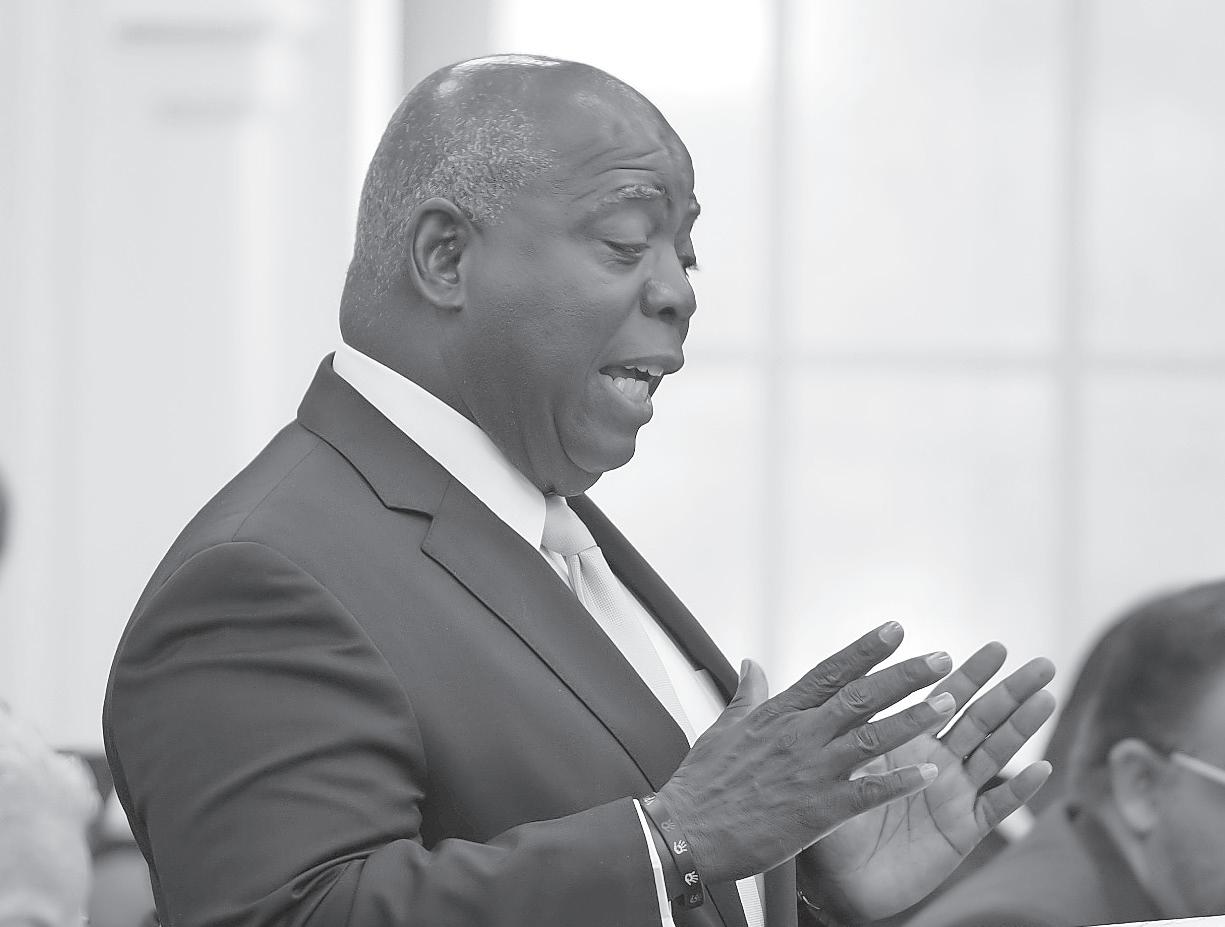
Prime Minister Philip “Brave” Davis unveiled the initiative in the House of Assembly yesterday, though key details, including whether a fee will be attached, remain undisclosed. The FVDC will be valid for two years and restricted strictly to cruising. It will not permit
fishing or anchoring.
For private aircraft, a version of the card will apply to propeller-driven planes. This version will be linked to each aircraft’s serial number and limited to leisure travel — explicitly excluding commercial operations and charters.
Mr Davis positioned the card as part of a broader agenda, saying: “We are moving forward with purpose, and with Bahamians in mind every step of the way.” He underscored the administration’s focus on fairness, modernisation, and investor respect.
In a parallel
about safety in the jet ski industry. In April, the Ministry of Energy and Transport responded to recent rape investigations involving individuals operating illegally without Port Department authorisation. The ministry, echoing complaints from licensed jet ski operators, stated these unauthorised individuals do not represent the broader, regulated watercraft industry, which the Commercial Recreational Watercraft Act governs.
In a statement at the time, the ministry reaffirmed its commitment to enforcement through police vetting, licence revocations, and strict penalties for non-compliance. The statement followed a travel advisory issued by the United States Embassy, warning visitors about the risk of sexual assault tied to jet ski rentals in The Bahamas. The alert came after two reported incidents within one month, including the alleged rape of a 23-yearold American woman near Junkanoo Beach, where a man has since been charged in that case.
In response to the safety crisis, the Royal Bahamas Police Force, Port Department, Ministry of Tourism, hotel representatives, and other industry stakeholders formed a joint task force. Their focus included strengthening the vetting process for operators, improving training, ensuring insurance compliance, and enforcing fair operating conditions.
announcement, Mr Davis revealed that the government is intensifying efforts to hold cruise lines accountable, a strategic move following a record-breaking 9.4 million cruise visitors in 2024, up 20.3 percent from the previous year, representing 83.4 percent of total tourist arrivals.
Yet, he warned, government revenue from the cruise sector has failed to keep pace with this explosive growth.
To close the gap, the government is launching compliance actions, including enforcing customs duties and VAT on all imports to private cruise destinations; applying immigration work permit fees for all employees; regulating private utilities through the Communications and Electricity Acts; levying VAT on all services provided for value on cruise islands; and enforcing the policy that reserves recreational watercraft rentals for Bahamians.
“We expect that the economic activity on the private cruise destinations will be the biggest driver of GDP growth in the next three to five years, which underscores the importance of the information I’ve just shared,” Mr Davis said.
By EARYEL BOWLEG
Reporter
ebowleg@tribunemedia.net
PRIME Minister Philip Davis has announced a broad slate of infrastructure and operational upgrades across The Bahamas’ law enforcement agencies, including the construction of a new Police Headquarters and a fire station. The fire station, which will be developed through a public-private partnership, is part of a strategy to deliver critical public safety infrastructure in a cost-efficient way.
presented to the House of Assembly, the government will also procure modern fire trucks, protective equipment, and advanced firefighting tools.
As outlined in the 2025/26 Budget Communication
Significant upgrades are planned for the Royal Bahamas Defence Force (RBDF), including modernization projects at the Coral
Harbour and Inagua bases.
The initiative includes fleet improvements and aircraft refurbishments aimed at boosting aerial surveillance, mobility, and operational responsiveness.
To enhance frontline presence, the government is expanding manpower across agencies. This move is intended to strengthen enforcement, accelerate processing times, and ensure a stronger presence at ports of entry and across the Family Islands.

In New Providence, the government has allocated funds for a boundary wall, improved surveillance systems, and upgrades at the Detention Centre. Similarly, the Grand Bahama Detention Centre will undergo renovations to align with national safety and security standards.
Recruitment efforts are underway within the Royal Bahamas Police Force to bring in new officers and civilian staff, enhancing visibility and response effectiveness in New Providence and Freeport.
The budget also includes funding for IT modernisation, with a focus on enhancing surveillance infrastructure, deploying digital forensic tools, and upgrading the AFIS-ADEMIA system to support real-time
investigative work and policing.
Nationwide communication networks and CCTV systems will be expanded, especially in high-risk areas. New technologies will also be introduced to curb illegal communications by inmates and prevent drone intrusions into secure facilities.
In addition, the government is strengthening the correctional system through the hiring of new personnel and providing uniform allowances. Plans are in place to procure body-worn cameras and to invest in advanced surveillance systems to enhance perimeter security and prevent unauthorised deliveries.
To improve judicial efficiency, the government is dedicating resources to expand the Virtual Courts platform. This measure is expected to help reduce case backlogs and streamline court proceedings, building upon earlier investments in the judicial sector.
By JADE RUSSELL Tribune staff Reporter jrusssell@tribunemedia.net
THE government will extend the National Breakfast Programme to every government primary school, aiming to ensure no child starts the day hungry.
During his 2025/2026 Budget speech in the House of Assembly yesterday, Prime Minister Philip “Brave” Davis said the programme has provided nearly one million free hot breakfasts to students. The programme provides free, healthy, and nutritious breakfasts to students in public schools across the country. The Davis administration has highlighted that the initiative ensures no child goes hungry, allowing them to focus and learn effectively in school.
The $1m programme was initially launched in New Providence at four primary schools and expanded to four Family Island schools in November 2023. In August 2024, education officials announced further expansion, including Yellow Elder Primary and four additional schools in New Providence.
“School Breakfast reflects our belief that all of our children deserve a chance to start their day ready to learn. That’s why our new budget expands the programme, ensuring it will soon reach every one of our government’s primary schools,” Mr Davis said during his budget contribution.
In February, the Davis administration marked the delivery of 500,000 breakfasts since the National
School Breakfast Pilot Programme (NSBPP) began in October 2023. Currently, the programme operates in 90 schools nationwide, including primary, all-age, and comprehensive schools. Officials said 100 vendors support the initiative.
The programme faced early criticism on social media after some meals were compared to “jail food”, but government officials defended its value.
Minister of Education Glenys Hanna Martin highlighted the programme’s role in improving attendance and punctuality. In August 2024, she said attendance increased by 3.9 percent at participating schools in New Providence and by 7.2 percent in Family Island schools.

By KEILE CAMPBELL Tribune Staff Reporter kcampbell@tribunemedia.net
AN amendment to the Immigration Act, set to take effect on July 1, 2025, will introduce a new daily fee of $3 for work visas issued to people employed on passenger ships. The fee, which includes National Insurance contributions, falls under the Immigration (Fees) (Amendment) Regulations, 2025.
Immigration and National Insurance Minister Alfred Sears tabled the amendment during the opening session of the budget communication in
the House of Assembly. It is part of a broader slate of new labour-related fees introduced by the Davis administration, despite its repeated claims of not increasing or introducing new taxes. In 2023, a five percent levy was imposed on work permits for occupations in scales 1 to 3, which include executive and professional roles. In 2024, the expedited processing fee was revised to 10 percent of the actual permit cost, with a minimum charge of $400, a measure intended to speed up approvals and bolster revenue.
Prime Minister Philip Davis has defended the
government’s approach to work permits, saying efforts are underway to place Bahamians in roles that have seen work permit renewals for up to 15 years.
Mr Sears previously told the House of Assembly that fee adjustments have significantly boosted immigration revenue. Between July 2023 and May 2024, the Department of Immigration reportedly collected approximately $108m.
Opposition members have challenged the sustainability and ethics of relying on immigration fees for revenue, arguing it signals a lack of long-term economic planning.



NULLIUS ADDICTUS JURARE IN VERBA MAGISTRI
“Being Bound to Swear to The Dogmas of No Master”
LEON E. H. DUPUCH
Publisher/Editor 1903-1914
SIR ETIENNE DUPUCH, Kt., O.B.E., K.M., K.C.S.G., (Hon.) LL.D., D.Litt .
Publisher/Editor 1919-1972
Contributing Editor 1972-1991
RT HON EILEEN DUPUCH CARRON, C.M.G., M.S., B.A., LL.B.
Publisher/Editor 1972-
Published daily Monday to Friday
Shirley & Deveaux Streets, Nassau, Bahamas N3207
TELEPHONES
News & General Information
(242) 502-2350
Advertising Manager (242) 502-2394
Circulation Department (242) 502-2386
Nassau fax (242) 328-2398
Freeport, Grand Bahama (242)-352-6608
Freeport fax (242) 352-9348
WEBSITE, TWITTER & FACEBOOK
www.tribune242.com

@tribune242

WAS this a pre-election Budget?
That was what FNM leader Michael Pintard branded yesterday’s communication in the House by Prime Minister Philip Davis. And he was not alone –more than a few such comments came the way of The Tribune yesterday. There is of course talk of an election in the air. Mr Pintard has suggested it might be a September vote. The prime minister has said no vote is imminent but the date “is here in my heart”. The PLP chairman, Fred Mitchell, meanwhile, is talking about going full term. There is certainly a lot still to be done – there always is – but the way in which Mr Davis was talking up the economy made some wonder if this might be the last Budget communication we will see before a new term comes.
Mr Davis noted repeatedly the Budget surplus, the first since Independence as he pointed out.
He hailed the reduction of tax to five percent on a range of items that once upon a time did not have VAT at all. And so there is now VAT at five percent rather than ten percent on diapers, adult diapers, feminine hygiene products, prescription and non-prescription drugs, medical and dental supplies and some other therapeutic items. This is in some measure taking tax back that the government put on in the first place, and certainly does not align with the theory of having one percentage for all VAT to make things simpler.
The devil is in the detail where it comes to much of the rest of the Budget – and while Economic Affairs Minister Michael Halkitis had trumpeted “no new taxes” beforehand, the
assortment of fees and fee changes still take money out of the pocket.
The news on the surplus is good –though not as good as it could have been if the government had hit its own projections.
Then there were some other interesting moments – exemptions on appliances that meet the highest efficiency thresholds, efforts to get more income from cruise ships with a recognition they are using private islands more and more, customs duty removed on a range of construction materials, creating a framework for an environmental levy on seabed leases.
There was a frequent visitor card plan for regular visitors by boat or propeller plane – although this too might be remedying some of the issues brought in by fees brought in by the government.
Mr Davis ended by talking of his “deep optimism for the country”.
Was this the ringing endorsement of a Budget that he expected to carry the Bahamian people through to the ballot box where they would mark their X next to his party’s name?
For all the areas that are positive, it felt a little way short of a pre-election Budget. People will need to feel those benefits in their pockets when they consider their vote – and this perhaps was not that Budget. Perhaps the best thing to come from it was that news about the surplus. That really is welcome news.
As for the rest, political sides will champion their reviews of it. PLPs will hail it as wonderful, the FNM will say it is not enough. But will it be enough to bring enough good feeling to lead towards an election? We shall see.
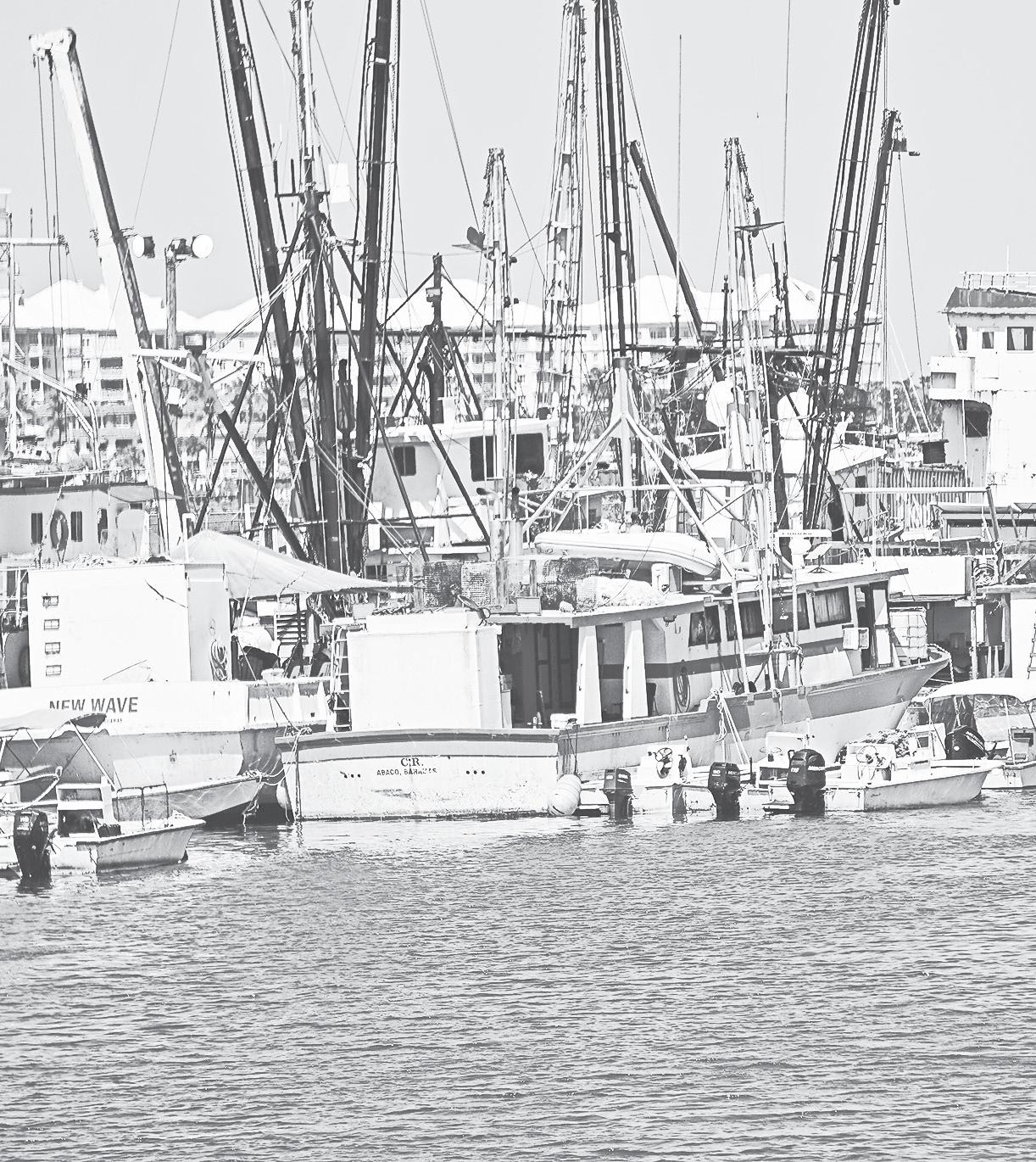

EDITOR, The Tribune.
THE recent revelation that the Davis administration included the prestigious title of King’s Counsel (KC) as part of a Memorandum of Understanding with labour unions is nothing short of disgraceful. This move reduces a centuries old legal distinction, one earned through merit, skill, and demonstrated excellence in advocacy, to a bargaining chip in a cheap political stunt.
The title of King’s Counsel is not a political favor. It is traditionally reserved for attorneys who have distinguished themselves through
superior legal acumen and who are recognised leaders in the courtroom. These are individuals trusted with the most complex, high stakes matters of law because they have proven, over time, that they meet the highest standards of the legal profession.
To hand out this honor as part of a political negotiation confirms what many Bahamians have feared: this administration has no respect for the independence or integrity
of our judicial system.
The PLP is willing to undermine the sanctity of our institutions if it serves their political interests. What’s next a judgeship in exchange for votes?
The Davis administration must answer for this reckless disregard for legal tradition and professional merit. Our legal system is not a political playground. It is a cornerstone of our democracy, and it deserves to be protected from this kind of blatant politicisation.
EDITOR, The Tribune.
THERE are many aspects of the Bahamian judicial system is overburdened and glaringly backward! One that seems the most antiquated relates to our divorce laws. The institution of marriage has two components, the spiritual and the civil. People take an oath before God (spiritual) in the presence of human witnesses. However, there is also a natural side to marriage as well, that is governed by man-made law (civil). So, it is possible for a marriage to be broken spiritually and for men to continue to recognise it in spite of the desire of the parties. Many are forced to remain in it unnecessarily because of red tape created by the government! In the Bahamas, the law of men says that divorce can only occur for one of six reasons: adultery, homosexuality, cruelty, desertion (for a period of two years before filing the petition), bestiality, living apart for at least five years and rape by the husband.
The bible permits divorce in the instance of adultery, for with that act the spiritual oneness of the marriage is broken. Jesus also noted that it is because of the hardness of the heart of man that divorce was permitted, although that was not the original intent!! From the civil perspective, there should be two pathways for divorce: one that requires judicial intervention (if there are decisions to be made regarding property, payments or children) and the other should be administrative via their lawyers (people without complex issues should be able to agree, apply and have it granted). This would reduce the back log in the courts, reduce the stress on the parties involved, provide a greater level of privacy and provide finality at a much faster pace, so that people can get on with their lives. After all, marriage is a contract entered into by adults and if those adults want to move on with their lives, they should have the option to be able to do so
without having to air their dirty laundry or going through costly, drawn out procedures! I stress that none of this diminishes the esteem in which marital oaths should be held! Let God address the spiritual issues that may exist, but the government must make the civil process easier for those who need it! This is not an issue in which the Christian Council should have any say, because they were not there when people took their vows; nor were they there when vows were broken or when people decided they want to go their separate ways!
Legislators are constantly passing laws that are largely unenforceable and not beneficial in a tangible way for the populace. An easier route to divorce may be one way people can be quickly unburdened of the past and move on with their lives! It just seems unjust to do otherwise!
SELAH Nassau, May 17, 2025.
EDITOR, The Tribune.
THE growing number of stray and suffering animals on our streets is a clear sign that we are failing to enforce our own laws. According to the Extraordinary Official Gazette of The Bahamas, dated June 22nd, 2016, Part IV, Duties of Owner of Animals, Section 36 on page 26, “No person shall carry out commercial animal breeding or any other commercial reproductive activities unless that person is in possession of a permit issued by the Director.” If this law is in place, why are backyard breeders still allowed to operate freely across our communities? Backyard breeding is more than just a nuisance— it is cruel, irresponsible, and dangerous. Many of these breeders do not have proper facilities, medical
knowledge, or even the intention to care for the puppies they produce.
As a result, The Bahamas is now overwhelmed with stray dogs, many of whom are sick, starving, and abandoned. The Bahamas Humane Society and organisations like BAARK are under constant pressure to rescue, rehabilitate, and rehome animals. Meanwhile, the Bahamas Humane Society has so many adoptable dogs and cats just waiting for a forever home—yet people continue to support illegal breeders instead of adopting. To make matters worse, many of the people who purchase animals from backyard breeders do not take proper care of them. These pets are often left to roam the streets, unspayed, unneutered, and unvaccinated, which leads
SENATOR MICHELA BARNETT ELLIS Nassau, May 27, 2025.
to more unwanted litters, more disease, and more suffering. And so, the cycle continues. What starts as a careless sale quickly becomes a communitywide problem that affects both animals and people. It is time for stricter enforcement. Authorities must crack down on illegal breeders and protect the animals who cannot speak for themselves. Citizens must also be part of the solution—by refusing to buy from backyard breeders, by reporting illegal breeding activity, and by supporting adoption and spay/neuter programs. We have laws in place for a reason. Let’s make sure they are followed—for the sake of our animals and our communities. Why put laws in place if they are not going to be used?
LATESHA CLARKE May 26, 2025.
Bahamas Defence Force
Chief Petty Officer Darrin
Roker, and Bahamian
William Simeon — were previously granted a delay and are scheduled to appear in court tomorrow and again on June 9, 2025, for a status conference.
In a letter sent to US
District Judge Gregory Woods yesterday, attorney Benjamin Silverman — who represents Ulrique Jean Baptiste, another defendant in the case — wrote on behalf of all parties, asking for more time to review discovery materials, engage in plea discussions, and continue investigating the case.
“I conferred with the government and other defence counsel, who all consent and I write to clarify that this was the request submitted earlier today by counsel for Mr Roker, even though that letter only referred to the defendants with June 9 conferences. Further, counsel for all defendants
By PAVEL BAILEY Tribune Staff Reporter pbailey@tribunemedia.net
A 31-YEAR-OLD man was remanded to prison yesterday after he allegedly molested his underage niece 22 times over the past two years. The defendant, whose name is being withheld to protect the identity of the minor, was arraigned before Senior Magistrate
Anishka Isaacs on 22 counts of incest. Prosecutors allege the man had unlawful sexual intercourse with his biological niece between August 1, 2023, and April 27, 2025, in New Providence, while the girl was between 9 and 11 years old. He was not required to enter a plea. The case will proceed to the Supreme Court by way of a voluntary bill of indictment
(VBI).
The defendant was informed of his right to apply for bail in the higher court and will be remanded to the Bahamas Department of Correctional Services until the potential service of his VBI on August 21.
Assistant Superintendent of Police K Bould served as the prosecutor, while Devard Francis represented the accused.
By PAVEL BAILEY Tribune Staff Reporter pbailey@tribunemedia.net
A 35-YEAR-OLD man was ordered to pay $2,500 in compensation to a 36-year-old woman after admitting to slapping her hip and assaulting her at a bar on First Street earlier this month.
Gregory Lafleur appeared before Senior Magistrate Shaka Serville, charged with indecent assault and assault. He was seen using a crutch in court.
The incident occurred at Bam’s Bar around 7.30pm on May 17, when Lafleur reportedly slapped the complainant’s hip. When confronted about his behaviour, he allegedly assaulted her further.
Lafleur pleaded guilty to the charges.
While Lafleur claimed he only touched the woman’s rear in an attempt to get to the bathroom, the complainant told the magistrate he slapped her hip “as if she were his woman”.
She added that after she slapped and kicked him in response, he struck her twice. She emphasised that the blows were not light and said that Lafleur also destroyed her $850 phone during the altercation. Her voice trembled in court as she recounted the incident, stating she believed the charges should have been more severe.
The complainant said she missed four days of work due to the incident. Although she occasionally saw the defendant at the bar, she said she did not know him personally and was shocked by his behaviour toward a stranger.
Inspector Cordero Farrington, the prosecutor, confirmed that the defendant had no prior convictions.
Magistrate Serville remarked that indecent assaults could be deeply demoralising and noted the complainant felt dominated by Lafleur’s actions.
Lafleur apologised to both the court and the complainant, stating he had been drinking at the time.
He was granted a conditional discharge on the condition that he remains on good behaviour. He was also ordered to pay the complainant $2,500 in compensation or face a sixmonth prison sentence.
Lafleur must pay $1,000 by June 27, followed by monthly payments of $600 until the debt is fully repaid.
By PAVEL BAILEY Tribune Staff Reporter pbailey@tribunemedia.net
A WOMAN was fined yesterday after admitting to dishonestly receiving $1,300 in a fake car sale scheme last September.
Jordan Rolle, 30, was arraigned before Senior Magistrate Kendra KellyBurrows on charges of receiving and money laundering. Prosecutors said Rolle received $1,300 from the CIBC account of Donrika Munnings between September 24 and 25, 2024, after falsely advertising a vehicle for sale on Facebook Marketplace. The complainant never received the car.
inform me that they consent to excluding time for an additional 60 days to allow time to review discovery and explore dispositions,” he said.
Curtis, Roker, and Simeon are among several Bahamians named in a federal indictment, alleging they exploited their official positions to enable the flow of drugs into the US. They were arrested in the US last year.
Another Bahamian, Theodore Nathaniel Adderley, was initially named in the indictment, but it was later revealed that investigators had mistakenly identified him. The indictment has since been corrected to name Ulrique Jean Baptiste in his place.
The charges stem from a sweeping federal investigation alleging that traffickers moved tons of cocaine through The Bahamas into the United States since 2021, aided by corrupt Bahamian government officials, including senior police officers.
Rolle must pay $500 before being released and is expected to return to court on July 31.
Sergeant Vernon Pyfrom served as the prosecutor.
Rolle pleaded guilty and accepted the facts of the case. She was ordered to fully reimburse the complainant and fined $1,500. Failure to pay would result in a fivemonth prison sentence.
By PAVEL BAILEY
Tribune
Staff Reporter
pbailey@tribunemedia.net
A MAN was granted bail yesterday after he allegedly broke into a home on Sisal Road West and stole a vehicle last week.
Micheal Stubbs Jr, 20, was arraigned before Senior Magistrate Anishka Isaacs on charges of housebreaking, stealing, and receiving. He is accused of breaking into the home of Clement Maycock and stealing a grey 2010 Nissan Note, valued at $6,000, on May 20.
Stubbs pleaded not guilty to all three charges. He was granted $4,000 bail with one or two sureties and is expected to return to court for trial on June 4.
Assistant Superintendent of Police K Bould served as the prosecutor.
BY VOCATION
and through life and pastoral experience, Pope Leo XIV possesses a missionary heart and zeal. In his first public greeting as pope, he remarked: “We must seek together how to be a missionary Church, a Church that builds bridges (and) dialogue, always open to receive (people), like this square, with open arms – everyone, all those who need our charity, our presence, dialogue and love.”
His words and his missionary spirt have been formed by his globalist cum cosmopolitan experience of pastoral ministry and his extensive travels. He has lived for extended periods in the United States, Peru and Europe. He has lived and ministered at the center and the periphery.
Pope Leo has served in various capacities including as: a young priest and more mature missionary in Peru; Provincial of the Chicago-based Midwest Province of the Augustinians; Prior General of the order; Bishop of Chiclayo in Peru; Prefect of the Dicastery for Bishops; and President of the Pontifical Commission for Latin America.
The Order of Saint Augustine (OSA), is present in approximately 50 countries, including in Europe, North and South America, Africa, Asia, and Oceania. The friars serve in cities and rural areas.
As worldwide head of the order for two six-year terms, Pope Leo came to better appreciate the challenges and gifts of the global commons, the

global church, and the Global South. He has experienced the centres of economic, political and church power and lived among those on the periphery of power and influence.
A man of the Americas, North and South, he also experienced many of the realities and tensions of the American superpower as well as the entrenched poverty of those on the margins in America and globally.
As an American who grew up, and worked in Chicago as an older man, and as a priest and bishop in poorer parts of Peru, the new pontiff also has strong views on racism and the struggles of indigenous people.
Why did Robert Prevost choose the name Leo XIV? For a new pope, his name is filled with a plenitude of meaning and history. It may include certain resonances. It includes contrasts and comparisons.
Leo XIV has come to the papacy with likely more global experience and travel than any other pope, which may be among the reasons a globally diverse College of Cardinals elected him.

While Leo will continue a number of the reforms of his predecessor, he

is not Francis 2.0. Like Leo XIII, who was the father of modern Catholic Social Teaching, the new pope will address the great contemporary social questions and signs of the times.
But the times are not same as those of Leo XIII
The new times include the communications and technology revolutions; the rise of new political and economic state and nonstate powers; the effects of the climate emergency; and dynamics of a global Roman Catholic community in the context of Vatican II and subsequent papacies.
As reported by Vatican News, in his first address to the College of Cardinals he invoked the legacies of Francis and Leo XII: “Pope Leo XIII with the historic encyclical Rerum Novarum, addressed the social question in the context of the first great industrial revolution. Today, the Church offers to all her treasure of social teaching in response to another industrial revolution and the developments of artificial intelligence.”
In the 1891 Rerum Novarum (“Of New Things”), Leo XIII rejected certain forms of socialism and unregulated capitalism. What ethical and theological insights, urgent appeals, and new language will the new pope bring to the Church’s social treasury?
Though born in the US, Pope Leo is not seen as the so-called typical overbearing American. Instead, his citizenship of both the United States and Peru, makes him a bridge builder between continents, peoples and worldviews.
Leo XIV has come to the papacy with likely
more global experience and travel than any other pope, which may be among the reasons a globally diverse College of Cardinals elected him.
In the modern era, Pope Paul VI began the tradition of greater travel by the pope. John Paul II expanded this travel of pilgrimage dramatically.
Pope Francis journeyed to countries no pope had ever visited including, countries ravaged by war and conflict and countries with small Roman Catholic or Christian populations.
Pope Leo will also visit major metropolitan areas. But he may surprise with pastoral and missionary trips to more so-called peripheral areas of the world. His pastoral style and message, formed in the A ugustinian tradition and in C anon law, will be honed as the successor to St Peter and Francis.
A moderate and centrist, Leo appears to combine traditional and progressive values and practices. He is neither left nor right, often a too easy categorisation loudly broadcast and debated by the global media and some elites. Rather than right or left, Leo is C hrist-centred.
A n institutionalist in the best sense, most of his ministry has not been at the Vatican, where he only served as head of a dicastery for two years before becoming pope. He appears not to have been “captured” by the bureaucracy.
Pope Leo’s words and choices thus far have been a measured blend. He will likely please and upset traditionalists and progressives at times depending on the matter.
Still, those of varying dispositions on a range of
ethical and ecclesiological matters, collectively desire a pope who will speak to the ever-urgent demands of peace and justice.
Like Francis, he continues to be an advocate for peace in various war zones. He has offered the Vatican as a site to host peace talks between Ukraine and Russia.
What will Pope Leo’s vocation as a missionary and evangelist look like in his new ministry as spiritual leader of the Roman C atholic communion?
T he old image of the missionary as someone who goes to a foreign land to impose the will of a C hurch or the imperial conceits of colonial powers, has long been replaced by a sense of mission that is one of accompaniment, companionship and reciprocity.
What contemporary understanding of mission (missiology) and church (ecclesiology), rooted in the Scriptures and church teachings, including social teachings, will Leo X IV bring to his community of faith and the world?
A fter the recent conclave, A rchbishop C harles Jason Gordon, A rchbishop of Port of Spain and President of the A ntilles Episcopal C onference, of which T he Bahamas is a member, issued a press release entitled, “Walking Together with the C aribbean: Pope Leo X IV and O ur C hurch in the Peripheries.”
He noted: “ T he election of Pope Leo X IV signals not just continuity but also a new tone of quiet strength and missionary fidelity—one that speaks directly to the heart of the C aribbean C hurch.
“His deep roots in the Global South, formed by decades of missionary service in Peru, ensure that he understands the realities of poverty, cultural hybridity, and resilient faith that shape our region.” What missionary fidelity and concern for social justice and human development might this new pope of the A mericas, bring to the aspirations of the peoples of the C aribbean, who are typically sidelined?
We are often lumped in with C entral and South A merica. But we have our own vitality, and our specific challenges which need to be addressed in greater detail and frequency by global institutions and states including the Holy See. T he C aribbean needs advocates like the Vatican in the corridors of power.
T here are various peripheries including, geographic, existential and theological peripheries.
From the so-called peripheries of Peru and other areas served by the A ugustinians, what pastoral insights and lessons will Pope Leo, undoubtedly converted by the “peripheries”, bring to enliven, and to reform where necessary, the global church?
A t the periphery is where deep encounter and exchange occur, gifts which Robert Prevost found in other lands, and which he now brings to the centre, and may now amplify in service of the global Roman C atholic commons.
D URING the recent Joe Biden administration, the conventional wisdom in Washington was that Biden had racked up some really significant achievements for which he was given scant credit.
According to this narrative, the president’s success in directing the American economy out of the mire of the COV I D19 epidemic; passing landmark technology, environmental and economic stimulus legislative packages, and standing firm against bloodthirsty Vladimir Putin were all lauded.
But Biden failed to manage America’s southern border, ignoring the degree to which immigration demand had surged under the repression of the first Trump administration, and Biden persisted with a widely unpopular embrace of human rights, even as an immigrant wave turned into a perceived tsunami.
Biden also couldn’t reduce inflation until it was too late for his reelection prospects. Consumers just rebelled against prices that seemed to have an upward momentum of their own, sometimes confounding economists.
All of these theories dominated the political news cycle until Biden crashed and burned at the end of June in what must have been the most calamitous televised presidential debate performance in the 65 years of this widely watched event.
That night 11 months ago propelled Donald Trump back to the White House. He’s been back in office for four months and this time, we are witnessing many of the same characteristics in his direction of the federal government that we saw the first time around.
But as has been widely reported, Trump’s focus is sharper. And while his grifting and retribution receive most of the media coverage of his second administration, he risks obscuring some real achievements – actual and potential.
I f he isn’t careful, Trump might experience a fate similar to that of his predecessor.
I t’s now pretty widely acknowledged that Trump is the ablest demagogue in American political history. He has a real claim on another dubious title – his corruption and influence peddling are conducted so brazenly and so lucratively that observers have almost lost their astonishment and outrage at the extensive, open nature of the president’s quest for ever more personal


Trump wants to accept a replacement presidential aircraft from a Middle Eastern nation whose interest in bestowing this gift is transparently corrupt. Trump professes to see no moral or ethical issue. But others do. Then Trump hosts a dinner for 220 special guests who have invested massive sums of money in a cryptocurrency scheme whose purpose seems to be to gain access to Trump and his key policy advisors. The White House press secretary brushes off reporters’ questions with the remark that the dinner was “on the president’s personal time.”
This is taking “Pay to Play” to new extremes.
Trump is also, perhaps even more ominously, indulging in his passion for retribution to an unprecedented degree. For instance, he’s still pursuing James Comey, the FB I director he inherited from Barack Obama who, ironically, may have delivered to Trump the 2016 election by gratuitously refocusing attention on Hillary Clinton’s security lapses just before that election. But it’s Trump’s revenge tour against many of the most prestigious U S universities that has many observers worried that the president will somehow manage to
forfeit America’s greatest asset – its intellectual property.
Harvard has been most in the spotlight recently. In directly confronting one of America’s oldest, most prestigious and powerful institutions, Trump is betting that if he triumphs, he will so intimidate other universities to such a degree that they will abandon the liberal bias that admittedly prevails on most campuses.
Trump has been gradually escalating his attacks on mostly Eastern universities since he was elected. Initially, he delivered most of his attacks through House of Representatives ally Elise Stefanik, a central Hudson Valley New York congresswoman and Harvard graduate who has steadily risen in the ranks of congressional Trump supporters.
Stefanik and some of her GOP colleagues pushed the presidents of both the University of Pennsylvania and Harvard itself into premature resignations after her attacks flustered them into imprudent House testimony. Maybe such a capitulation only whetted Trump’s appetite for more Ivy League blood.
Late last week, the Trump administration revoked Harvard University’s ability to enroll international students, ordering that thousands
of current students must transfer to other schools or leave the country.
In its announcement, Trump’s Department of Homeland Security said Harvard has created an unsafe campus environment by allowing “anti-American, pro-terrorist agitators” to assault Jewish students on campus. The department also accused Harvard of training members of a Communist Chinese paramilitary group as recently as 2024. “This means Harvard can no longer enroll foreign students and existing foreign students must transfer or lose their legal status,” according to an agency statement.
Harvard enrolls almost 6,800 foreign students at its campus in Cambridge, Massachusetts - more than a quarter of its student body. Most are graduate students, coming from more than 100 countries. Like many prestigious universities in the US and elsewhere, Harvard takes pride in the geographic breadth and diversity of its students.
“This retaliatory action threatens serious harm to the Harvard community and our country, and undermines Harvard’s academic and research mission,” the university said in a statement.
According to news reports, this most recent dispute began with an
April 16 request from Homeland Security Secretary and former South Dakota governor Kristi N oem. The letter demanded that Harvard turn over information about foreign students that might implicate them in violence or protests that could otherwise lead to their deportation.
The Trump administration also revoked Harvard’s certification in the Student and Exchange Visitor Program, which allows schools to sponsor international students to get their visas and attend school in the U nited States.
The federal government has responded by cutting a reported $2.6 billion in federal grants at Harvard, forcing it to self-fund much of its sprawling research operation. Trump has said offhandedly that he wants to strip the university of its tax-exempt status.
With a current estimated endowment of $53 billion, Harvard boasts the largest university endowment in the world. Proposed higher endowment taxes and a cutoff of federal aid will hurt.
The source for most of the federal punishments directed at Harvard have come through a federal antisemitism task force.
According to this task force, Harvard has failed to protect Jewish students from harassment and violence during a nationwide wave of proPalestinian protests.
Those protests followed the massive, continuing I sraeli response to a Hamas sneak attack on Jewish border settlements near G aza last October.
“ I worry that this is sending a very chilling effect for international students deciding whether to come to America for education,” said the president of a group fostering international student exchanges. Harvard has forcefully pushed back against Trump and his administration. The university’s guiding Board of Directors is reportedly ready to defy the president, and the school is challenging Trump’s actions in federal court.
But even if Harvard wins its legal challenges in court, it might only harden Trump’s demands for retribution. The president’s willingness to continue to launch investigations, including from the Justice Department and the Department of Homeland Security, is only going to hurt Harvard.
An estimated half of the university’s research budget comes from the federal government. One pundit asked, “ I f you’re a researcher, do you want to be doing research at a school where your funding is in question?”
Harvard may have the biggest Trump target on its back, but other schools are watching and worried. For example, Yale has the second largest university endowment in the U S. Here are some excerpts from a letter to alumni by the university’s new president:
“The U S House of R epresentatives has passed legislation that proposes to raise the tax on the investment income of Yale and a number of other universities from 1.4% to 21%. Each year, this increased endowment tax would strip from Yale’s budget hundreds of millions of dollars that currently fund student financial aid, research, scholarship, and teaching.
“This legislation presents a greater threat to Yale than any other bill in memory. Today, I ask you to join me in defending the research that saves lives and keeps America competitive, and the students who keep our future bright.
“The endowment tax will undermine our country’s global leadership in technology. U niversities perform fundamental research that has led to advancements that define modern life, including M RI G PS, the internet, smartphones, and artificial intelligence, to name just a few.”


By JEFFARAH GIBSON Tribune Features Writer jgibson@tribunemedia.net
A NEW wave of creativity is being stirred in the local faith community, thanks to the launch of The Church of God of Prophecy Fine Arts Workshop.
The dynamic initiative fusing puppetry, drama, dance, music, and worship into one vibrant, soul-stirring experience is set to take place this Saturday between 10am and 2pm.
The workshop is the brainchild of Minister Samita Ferguson, fine arts director at the Church of God of Prophecy, whose deep passion for both ministry and creative expression fuels the entire endeavor.
For her, it is about equipping churches to communicate the gospel in ways that break beyond the traditional mold.
“The inspiration came from a desire to see churches equipped to ‘think outside the box’ in how they view the arts,” said Minister Ferguson.



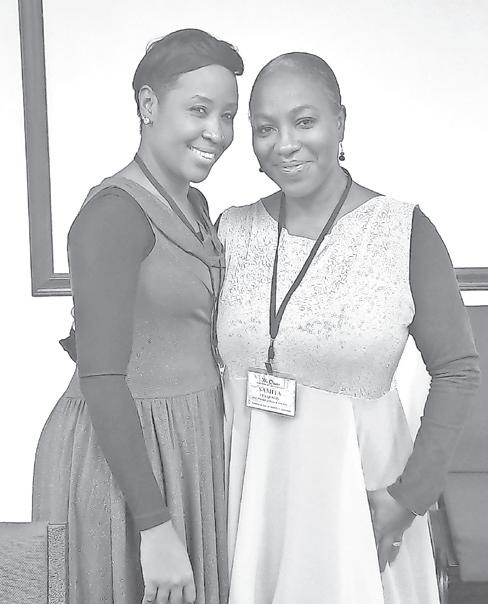
drama often help individuals see biblical truths come to life in new, profound ways.
“Some may receive healing just by watching a dance centered on healing. The gospel is still being preached just through sound, movement, and imagery. We can change the method but never the message.”
This first workshop, open to all ages, reflects Ferguson’s core belief that artistic talent and spiritual gifting are not confined by age or experience. “Talent is not defined by an age,” she said.
“Creative expression is a language that all can speak when given the tools and opportunity.”
The workshop introduces participants to several key disciplines: worship through art expression, puppet ministry, dance, and drama. It’s structured as an engaging
“The arts can be an effective tool used to bring the message of hope and life to our world. My vision is to see churches operating effectively, efficiently, and in excellence while tapping into every facet of the arts.”
and interactive learning space featuring an impressive lineup of facilitators, including Pastor Dwight Ferguson, Reverend Joy Rolle, Roslyn Miller, Sckeisa Knowles, and Nicole Musgrove. Each will guide sessions within their areas of expertise, offering participants hands-on tools for spiritual and creative growth.
A typical day includes a general session with spoken word, live worship, and teachings on art in ministry.
Rev Joy Rolle will teach on the importance of discipline in your craft, Minister Ferguson said.
“You can be skilled, yes but without the anointing,
there’s no transformation. That’s where the difference lies.”
Pastor Dwight Ferguson, a veteran in the world of worship arts, will demonstrate how visual storytelling and movement can make the Word of God come alive. Breakout sessions will provide smaller group training in dance, drama, and puppetry.
“There will be surprises, prizes, and lots of creative energy in the room,” Minister Ferguson added. But the heart of the workshop goes beyond technique. It’s about transformation especially for young people looking to deepen their faith.
“Creative expression allows one to show their love for God in powerful ways,” she said. “I’ve seen people who were never involved in the arts blossom once given the opportunity. Their confidence grew, their faith deepened, and their walk with Jesus was strengthened.”
Minister Ferguson believes that the arts are is an essential part of ministry.
“The world is colourful. Jesus was the master. He made all things bright and beautiful. Some people absorb the message more from an illustration or a visual story than from sitting in a pew for hours.” She noted that dance and
Her goal for each attendee is simple but powerful: “I want participants to walk away feeling accomplished, confident, and empowered to take what they have learned back to their local churches. Let them shift the way they evangelise, using bold, creative tools that help their ministry grow and flourish.”
As Minister Ferguson sees it, fine arts in ministry is not just about performance it is about purpose.
“When we get to heaven, we will be singing, dancing, and rejoicing around the throne,” she said. “That, to me, is art.”
For more information on upcoming sessions or to get involved, reach out to call 242-466-4985.
By ALESHA CADET
Tribune Features Reporter acadet@tribunemedia.net
THIS Saturday, Carmichael Road will come alive for the body, mind and soul of the community. It’ll pulse with the energy of Bahamians taking charge of their well-being, thanks to the Remnant Tabernacle of Praise Church’s annual “Spring Into Health” Health Fair.
Set for May 31, from 7.30am-3pm, the fair promises a full day of interactive health screenings, wellness workshops, fitness challenges, food demos, giveaways and more; all held on the church’s grounds at 309 Carmichael Road.
Grace Toote, speaking on behalf of the organising committee, emphasised that the Remnant Tabernacle of Praise is inviting the entire community to attend, connect, and spring into better health together.
“Whether you’re looking to check your blood pressure, get moving with a fun workout, learn new ways to cook healthy meals, or gain insight into financial wellness, this health fair has something for everyone,” she noted.
The organisers believe at the heart of it all is a powerful mission: wholeness.

“This isn’t just about checking your pressure or counting your steps,” said Dr Charmaine Bodie, lead organiser of the event. She said the health fair is about reclaiming your health, your wholeness, and your power; physically, mentally, spiritually, and financially.
“We believe God wants us whole, and we’re creating a space for people to take the first or next step toward that,” said Dr Bodie.
Ms Toote said behind the scenes, the Remnant health committee, led by Dr Bodie, has been working in tandem with a team of medical professionals, wellness experts and community leaders to bring together a well-rounded lineup that addresses the many aspects of healthy living.
For Pastor Melvin Grant, the host pastor of Remnant Tabernacle of Praise

Church, the fair represents a tangible expression of the church’s commitment to holistic ministry.
“God cares about the whole person, body, mind, and soul. We’re not just preaching health from the pulpit, we’re bringing it to the people with practical tools, real experts, and the wholeness of community,” said Pastor Grant.
Moreover, the day’s activities are scheduled to include presentations from esteemed local professionals such as: Dr Greggory Pinto on Men’s Health and Prostate Awareness (8.10am–8.40am), Dr Shantalasha Knowles on Women’s Health
(9am–9.30am), Minister Tamico Bain on Financial Fitness and Budgeting (9.40am–10.10am), Dr Sean Knowles on Mental Health and Wellness (10.30am–11am), Dr Norad Morgan on STD Education and Prevention (11.30am–noone), Dr Miquela Rolle on Rehabilitation and Fitness (12.30pm–1pm), Dr Opal Stubbs on Physiotherapy and Mobility (2pm–2.30pm), and Dr Theresa Clarke on Alzheimer’s Detection (2.30pm–3pm).
From hands-on mobility sessions to financial literacy advice, the fair caters to every age and stage of life.

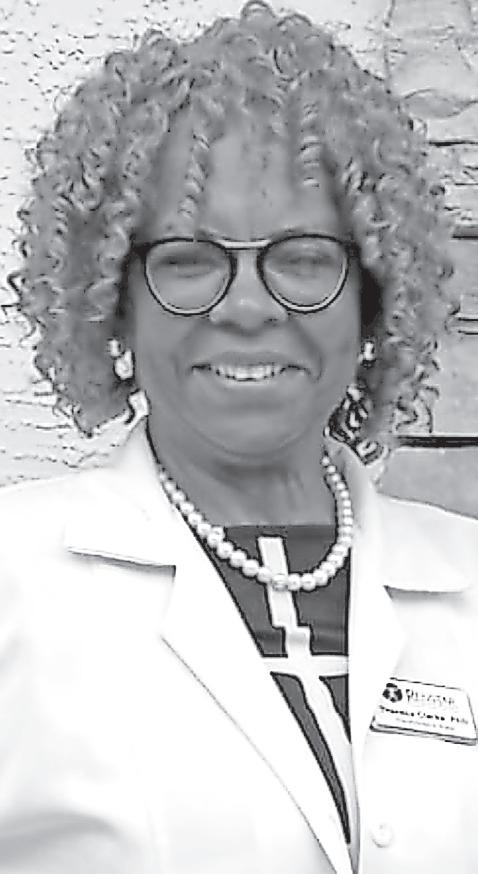
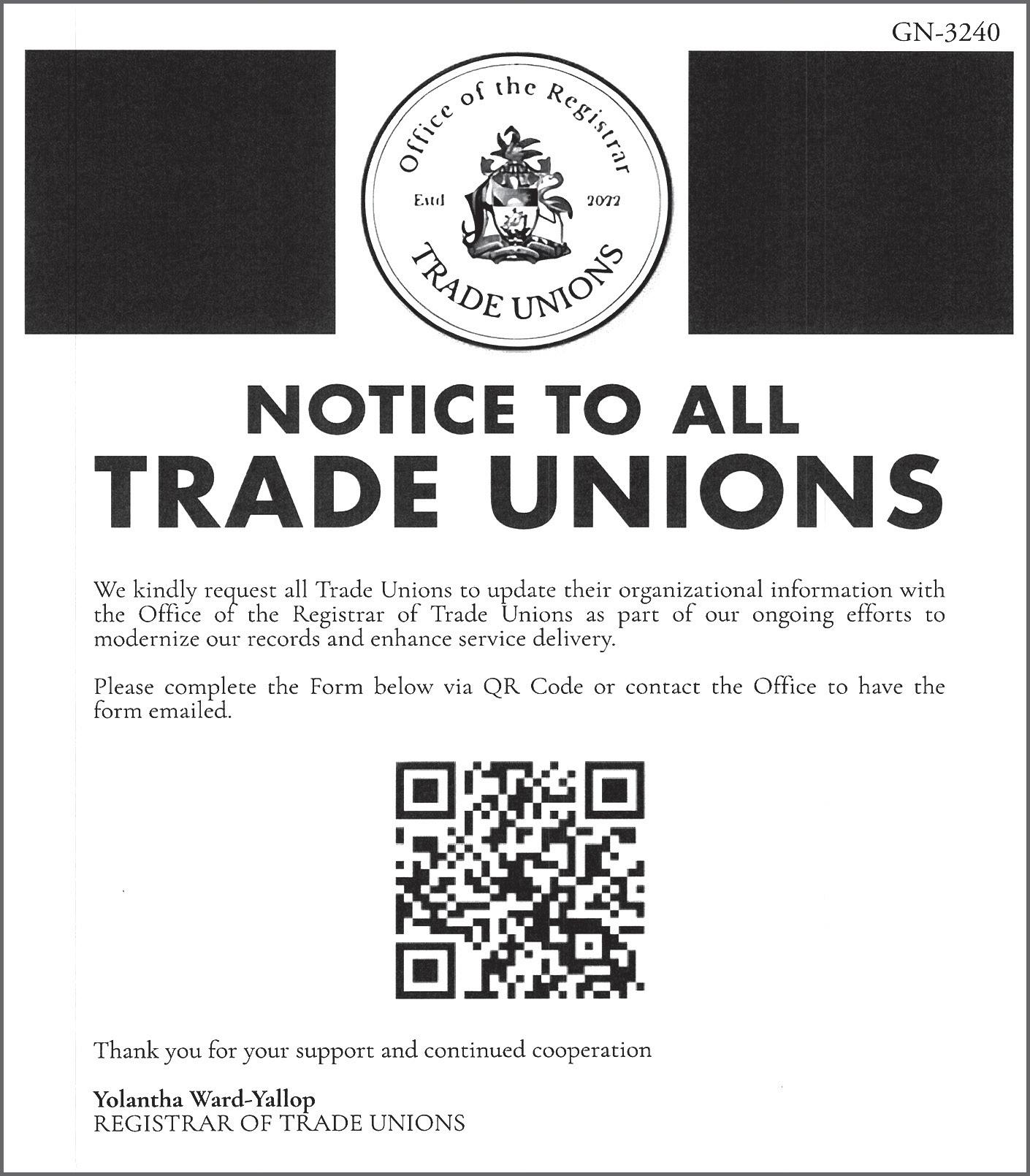
from page one
recent weeks, with the latest blaze sweeping through the Spring City area and reigniting public frustration over the long-standing crisis at the site.
Residents argue the dump — originally intended as a temporary solution in Dorian’s aftermath — has long exceeded its capacity and now poses ongoing health and environmental risks.
Yesterday, Mr Pinder told The Tribune the site was established under the former Minnis administration but is now being actively cleared by the Davis administration.
He said the site is approximately 85 percent demobilised, with contractors working around the clock to complete removal efforts.
“It’ll be resolved in soon time,” he said. “And we’re
looking for to assist the residents any way we can in terms of social services and and health assistance, which were also in the meeting that we had with the town residents.”
He said he has met with officials from the Departments of Health and Social Services and has asked officials to conduct an air quality test in the community.
Spring City residents have long criticised the government’s decision to place the dump near a residential area and blasted the lack of response to years of complaints.
They said the smoke from the area whenever a fire breaks out has shuttered businesses, kept children home from school, and trapped people inside their homes, describing it as a public health emergency that demands immediate action.


A FEDERAL court on Wednesday blocked President Donald Trump from imposing sweeping tariffs on imports under an emergency-powers law, swiftly throwing into doubt Trump’s signature set of economic policies that have rattled global financial markets, frustrated trade partners and raised broader fears about inflation intensifying and the economy slumping.
The ruling from a threejudge panel at the New York-based US Court of International Trade came after several lawsuits arguing Trump’s “Liberation Day” tariffs exceeded his authority and left the country’s trade policy dependent on his whims.
Trump has repeatedly said the tariffs would force manufacturers to bring back factory jobs to the US and generate enough revenue to reduce federal budget deficits. He used the tariffs as a negotiating cudgel in hopes of forcing other nations to negotiate agreements that favoured the US, suggesting he would simply set the rates himself if the terms were unsatisfactory.

White House spokesperson Kush Desai said that trade deficits amount to a national emergency “that has decimated American communities, left our workers behind, and weakened our defence industrial base — facts that the court did not dispute.”
The administration, he said, remains “committed to using every lever of executive power to address this crisis and restore American Greatness.”
But for now, Trump might not have the threat of import taxes to exact his will on the world economy as he had intended, since
doing so would require congressional approval. What remains unclear is whether the White House will respond to the ruling by pausing all of its emergency power tariffs in the interim.
Trump might still be able to temporarily launch import taxes of 15% for 150 days on nations with which the US runs a substantial trade deficit. The ruling notes that a president has this authority under Section 122 of the Trade Act of 1974.
The ruling amounted to a categorical rejection of the legal underpinnings of

some of Trump’s signature and most controversial actions of his four-monthold second term. The administration swiftly filed notice of appeal — and the Supreme Court will almost certainly be called upon to lend a final answer — but it casts a sharp blow.
The case was heard by three judges: Timothy Reif, who was appointed by Trump, Jane Restani, named to the bench by President Ronald Reagan and Gary Katzman, an appointee of President Barack Obama.
“The Worldwide and Retaliatory Tariff Orders exceed any authority granted to the President by IEEPA to regulate importation by means of tariffs,” the court wrote, referring to the 1977 International Emergency Economic Powers Act.
The ruling left in place any tariffs that Trump put in place using his Section 232 powers from the Trade Expansion Act of 1962. He put a 25% tax on most imported autos and parts, as well as on all foreignmade steel and aluminum. Those tariffs depend on a Commerce Department investigation that reveals national security risks from imported products.
It was filed in the US Court of International Trade, a federal court that deals specifically with civil lawsuits involving international trade law. While tariffs must typically be approved by Congress, Trump has said he has the power to act to address the trade deficits he calls a national emergency. He is facing at least seven lawsuits challenging the levies. The plaintiffs argued that the emergency powers law does not authorize the use of tariffs, and even if it did, the trade deficit is not an emergency because the US has run a trade deficit with the rest of the world for 49 consecutive years.
Trump imposed tariffs on most of the countries in the world in an effort to reverse America’s massive and long-standing trade deficits. He earlier plastered levies on imports from Canada, China and Mexico to combat the illegal flow of immigrants and the synthetic opioids across the US border.
His administration argues that courts approved then-President Richard Nixon’s emergency use of tariffs in 1971, and that only Congress,
and not the courts, can determine the “political” question of whether the president’s rationale for declaring an emergency complies with the law.
Trump’s Liberation Day tariffs shook global financial markets and led many economists to downgrade the outlook for US economic growth. So far, though, the tariffs appear to have had little impact on the world’s largest economy.
The lawsuit was filed by a group of small businesses, including a wine importer, V.O.S. Selections, whose owner has said the tariffs are having a major impact and his company may not survive. A dozen states also filed suit, led by Oregon. “This ruling reaffirms that our laws matter, and that trade decisions can’t be made on the president’s whim,” Attorney General Dan Rayfield said. Oregon Sen. Ron Wyden, top Democrat on the Senate Finance Committee, said the tariffs had “jacked up prices on groceries and cars, threatened shortages of essential goods and wrecked supply chains for American businesses large and small.”





